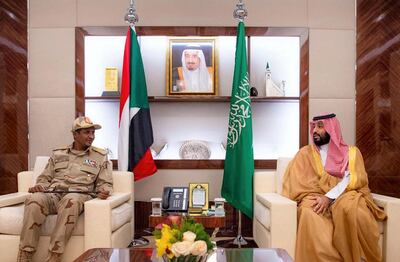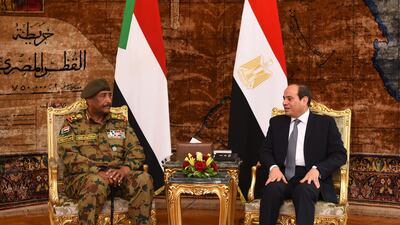Weekend visits to Egypt and Saudi Arabia by Sudan's top general have earned the country's military leadership legitimacy as it negotiates with protest leaders after the removal of longtime president Omar Al Bashir.
The military ousted Mr Al Bashir, 75, on April 11 after nearly four months of street protests that started over price rises and shortages, but soon turned into calls for him to step down after 29 years in power.
But the protesters have continued a sit-in outside armed forces headquarters in Khartoum, now demanding that the transitional military leadership hand over power to civilians.
Talks between the generals and protest leaders are deadlocked over the leadership and composition of a council that will govern during a three-year transitional period.
The protest leaders want a civilian head and most of its 11 seats, while the military wants one of its own to lead the body and for the generals to outnumber civilians.
The civilians say sacrifices during four months of demonstrations – about 100 killed and thousands wounded or tortured – were not made for military rule to replace Mr Al Bashir, a former general.
The military says it must stay at the helm to ensure security and stability.
Sudan's top two generals visited Saudi Arabia and Egypt, which have vested and vital interests in what happens in Sudan, as the destination of their first foreign visits since Mr Al Bashir's removal.
The visits by Gen Abdel Fattah Al Burhan to Egypt on Saturday and by his deputy, Gen Hamdan Dagalo, to Saudi Arabia the day before take on added importance after a strike called for this week by protest leaders raised the prospect of more unrest.
The strike, set for Tuesday to Wednesday, means public and private sector employees will report to work but not carry out any tasks and will stage street demonstrations at the end of the day.
It is the first of several steps culminating with an indefinite strike or civil disobedience, said the Sudanese Professionals Association, a key faction in a group of political parties and trade unions called the Declaration of the Forces for Freedom and Change.

The two generals will see the recognition and good-will in Egypt and Saudi Arabia as useful assets in their dispute with the protest leaders.
Gen Al Burhan said that his country would not forge relations with any nation working against the interests of Egypt and Gulf states.
That was a thinly veiled reference to Qatar and Turkey, two countries at odds with Cairo, Riyadh and their Gulf allies, and which were often courted by Mr Al Bashir to pressure Egypt and Gulf Arab states.
While in Cairo, Gen Al Burhan pledged the continued presence of Sudanese troops in the Saudi-led coalition fighting Iran-backed Houthi rebels in Yemen.
Gen Dagalo pledged Sudan's support for Saudi Arabia against Iranian "threats and aggression", a reference to attacks by drones on Saudi oil terminals and tankers, blamed on the Houthis.
Saudi Arabia and the UAE have between them pledged $3 billion (Dh11bn) in aid to Sudan, easing fuel and bread shortages in the vast Afro-Arab nation.
A statement by the military council on Gen Dagalo's talks in Saudi Arabia said Crown Prince Mohammed bin Salman had promised "vast Saudi investment" when political stability was restored in Sudan.
But Sudan's protesters have been wary of what they perceive as foreign meddling in their country.
Several hundred Sudanese demonstrated outside Egypt's Khartoum embassy last month to protest against Cairo's "interference" in Sudan.
Some protesters at the sit-in also carry banners decrying foreign attempts to derail their revolution.
After talks with Gen Al Burhan, Egyptian President Abdel Fattah El Sisi stressed "Egypt's full backing for Sudan's security and stability and its support for the free will and choices of the Sudanese people as they chart the future of their country", his office said.
Cairo has historically viewed Sudan as a strategic ally, with its southern neighbour controlling the middle reaches of the Nile River, Egypt's lifeline.
It was relieved to see the removal of Mr Al Bashir, who was considered an unreliable and unpredictable ally, but is now concerned that his hardline allies could take advantage of a political vacuum to seize power again.
Faced with an insurgency in the Sinai Peninsula, Cairo has long complained that the Bashir government provided sanctuary to militants and leaders of the Muslim Brotherhood group, which is outlawed in Egypt.
It has accused Khartoum of looking the other way as fighters and weapons entered Egypt across their desert border.
Tension flared when Mr Al Bashir sought to revive a longtime dispute over an Egyptian-held border strip and when he appeared to side with Ethiopia over a dam Addis Ababa is building on the Nile.
Egypt says the dam could significantly reduce its share of the river's waters.
As current chairman of the African Union, Mr El Sisi in April successfully persuaded the organisation to extend to three months a 15-day ultimatum it had given Sudan's ruling military to hand over power to a civilian government.
Sudan faces suspension if it does not comply by July, a fate that Egypt briefly endured in 2013 after its military, then led by Mr El Sisi, removed divisive president Mohammed Morsi of the Brotherhood.


